11 Best first-time Europe itineraries for 1, 2, or 3 weeks
Europe is going to be very busy in the summer of 2024 as the world is back to normal and travel demand is higher than ever. One other key factor is that most European currencies are still hovering at lower levels historically compared to the US dollar, which means that Europe will feel somewhat cheap again this year. In fact, according to our World Backpacker Index, European cities like Lisbon, Madrid, and Munich are about 30% cheaper to visit than Boston, Chicago, and New York City. In other words, flying to Europe might seem expensive, but most things will be cheaper once you get there compared to the costs of visiting a large US city.
Below you’ll find 11 of the most popular and best itineraries for a first visit to Europe. Your first visit is not really the time to be different or creative, and the famous destinations tend to be popular for a reason. In other words, it’s kind of silly to visit, say, Bulgaria, if you’ve not yet been to France or Italy. I lay out the best options along with how long to stay in each place as a general guide. I also discuss Mediterranean cruises, which can actually be an amazing way to see a lot of Europe on your first visit, especially if you don’t like going back and forth to train stations and airports every 2 or 3 days.
For a bit of fun you might be interested in the cheapest 5-star hotels in Europe, which start at US$80 per night for really nice hotels. It helps show that if you choose some of the cheaper cities, you can treat yourself to some luxury that you can’t afford in most other places.
This article was last updated in March, 2024.
There are 11 starter itineraries described in detail below
- Classic London and Paris
- England and Scotland
- Paris and Italy
- Mediterranean cruise
- France, Belgium, and Netherlands
- Paris and elsewhere in France
- Italy
- Spain
- Germany
- Switzerland
- Best of cheap eastern Europe
For each itinerary there are suggestions of other destinations that are easy to add on to the main cities.
Note: This article was most recently updated in March, 2024
Building the best itinerary for your first trip to Europe
Below there are 11 popular itineraries for one week in Europe. If you’ve only got a week then choose one of them and assume you’ll return again to conquer more of this amazing part of the world. If you’ve got more time then you can choose from some of the top add-on suggestions for each one.
Start in the most famous cities
Your first visit to Europe is no time to try to be different or edgy. I recommend that you focus on these 5 great cities before you start branching out into cheaper or more obscure places.
Keep your travel days to a minimum
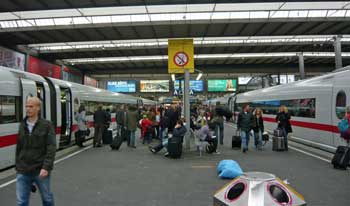
Spend 3 (or 4) nights in almost every major city
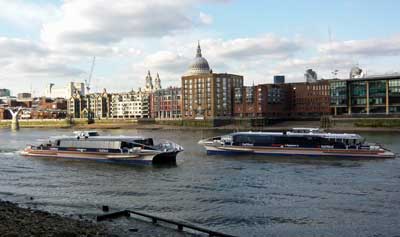
So many first-time visitors are initially planning on spending only 1 or 2 nights in major cities that I wrote a detailed explanation of why 3 nights is ideal for almost all European cities, even if you want to see as much as possible.
3 (or 4) nights will be enough for any city on your first trip
Most first-time visitors are tempted to move too quickly, but it can also be a mistake to move too slowly. It’s really amazing how much you can see in two full sightseeing days. If you spend too long in one city you’ll end up seeing things that are way down your list, while you could be in another city seeing things at the top of your list there.
Choose cities that are easy to reach from each other
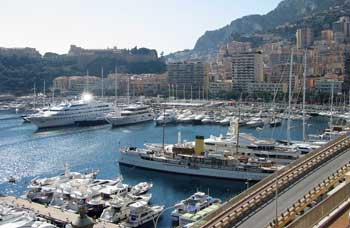
For your first trip it’s best to visit cities that are no more than a 5-hour train ride apart.
Choose cities that are connected by reasonable train rides rather than flights
To build on the point above, finding cheap flights within Europe is easy, but train travel is about a million times more enjoyable and less stressful. You’ll enjoy the train rides almost as much as the cities, so focus on places that are within 5 hours of each other by train.
Start with one of the classic itineraries below, and then add to it if you have more time
If you only have 7 days then you’ll find a list below of classic itineraries that are well-suited to a first visit to Europe. Hopefully you have more than 7 days though, and if you do you can add in one or more of the suggested add-on cities to build an itinerary that appeals most to you.
Best 1-week itineraries for the first time in Europe
Itinerary 1: Classic London and Paris
Fly into either city and take the 2-hour Eurostar train between them
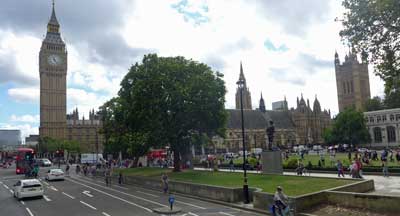
London highlights
- Big Ben and Parliament
- Westminster Abbey and St. Paul’s Cathedral
- Tower of London and Tower Bridge
- West End shows (Broadway equivalent) and classic pubs
- Buckingham Palace and Windsor Castle
Paris is actually far more beautiful than London and the food is famously much better as well. Since Paris gets so many tourists from non-French speaking countries, it’s easy to get by on just English, and the Metro system makes it fast and easy to get around. The architecture of both cities is amazing from the Tower of London, Big Ben, Westminster Abbey to the Louvre and the Eiffel Tower. These cities each pack a huge punch and they are very different from each other as well. Actually, England is arguably the best choice for your first trip to Europe.
Paris highlights
- Eiffel Tower
- Louvre Museum and Museum de Orsay
- Arc de Triomphe and other monuments
- Montmartre neighborhood and Sacré Coeur Cathedral
- Probably the world’s best affordable restaurants and wine
Best add-ons to London and Paris
- Edinburgh (2 or 3 nights, from London)
- Amsterdam (2 or 3 nights, from Paris)
- Bruges and Brussels (2 nights, from Paris)
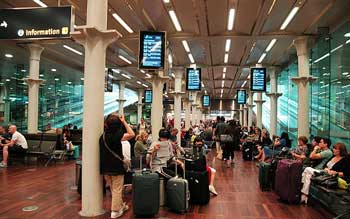
>>>Best one-week London and Paris itinerary in detail
>>>Check London hotel deals
>>>Check Paris hotel deals
Itinerary 2: England and Scotland
- London (3 or 4 nights)
- York (1 night)
- Edinburgh, Scotland (2 or 3 nights)
- Inverness, Scotland (2 or 3 nights)
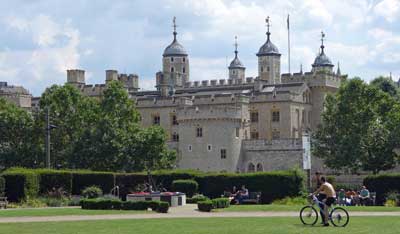
York is a small Roman city with intact city walls and one of the most famous cathedrals in Europe. Edinburgh is not only the capital of Scotland, but it’s easily the second most interesting city in all of Britain. If your time is short, skip York and spend more time in Edinburgh.
If you prefer to focus on the south of England on your first trip then the best option is to go to Bath or nearby Bristol after London. Bath is another of England’s top destinations and it’s a gorgeous city that has been a spa resort for many centuries. It’s also reasonably close to Stonehenge. You can also easily get to Cornwall in England’s southwest corner from Bath, and that’s a whole different and fascinating experience (with nicer weather than up north).
If you’ve got more than a week and want to spend more time in Scotland, especially in the summer months, the place to head to is Inverness. It’s a small town that is considered the gateway to the Scottish Highlands, but it’s an interesting and charming place on its own. You can take day-trips by bus to the highlights of the Highlands including the Isle of Skye and Loch Ness. Between you and me, it’s better to minimize time in Loch Ness or skip it altogether because it’s not one of the more photogenic parts of Scotland and the monster has always been a hoax.
Travel times between the recommended places
- London to York by train: 2 hours
- York to Edinburgh by train: 2.5 hours
- London to Edinburgh by train: 4 hours
- Edinburgh to Inverness by train: 3.5 hours
- London to Bath by train: 85 minutes
Best add-ons to England and Scotland
If you think you want to spend your whole trip in Britain you should have a look at our article on the best itineraries in England, Scotland, and Wales.
>>>Check London hotel deals
>>>Check Edinburgh hotel deals
Itinerary 3: Paris and Italy
- Paris (3 or 4 nights)
- Venice (1 night)
- Florence (2 or 3 nights)
- Rome (3 nights)
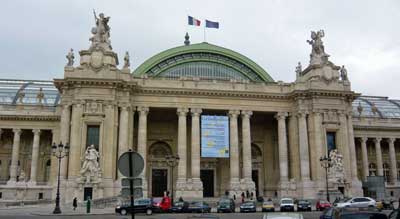
From Paris you can easily fly to Venice (or nearby Treviso) where you should try to spend about 24 hours. Venice is small enough to see in a full day, and so crowded that most people are satisfied to leave after that day. The key is to stay in the main part of the main island so you can enjoy Venice before the cruise passengers and day-trippers arrive, and also after they leave for the day. Two nights in Venice would not be wasted time, and it’s possibly the most gorgeous city in the entire world, but you can see the best of it in a bit over 24 hours.
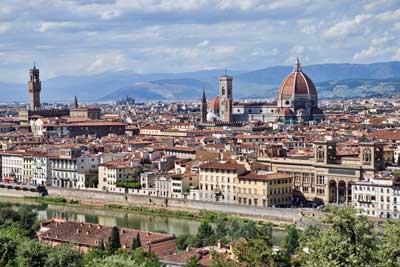
Rome also lives up to the hype and spending a day in the Vatican City will be a highlight even for non-Catholics, but it’s also a crowded and busy city so three days is usually enough for most people. Similar to Paris, Rome is an unusually beautiful city from almost any angle when you are in the historical center. You’ll walk through a stunning piazza (town square) and then turn a corner and you’ll see gorgeous buildings or public statues that are as nice as anything in the museums. Seriously, it’s worth a visit.
Paris to Venice flight: 1 hour 35 minutes
Venice to Florence by train: 1 hour 53 minutes
Florence to Rome by train: 1 hour 16 minutes
You can of course instead fly from Paris to Rome and then go north to Florence and then to Venice and fly home (or back to Paris) from there, and it would be just as enjoyable.
Best add-ons to Paris and Italy
France
- Nice/Cannes/Monaco (2 or 3 nights)
- Avignon (2 nights)
- Bourges (2 nights)
- Bordeaux (2 nights)
- Aix-en-Provence (2 nights)
- Reims (2 nights)
- Dijon/Burgundy (2 nights)
Italy
- Milan (1 or 2 nights)
- Lake Como (2 nights)
- Siena (2 nights)
- Cinque Terre (1 night)
- Naples/Sorrento/Amalfi Coast/Pompeii/Capri (3 to 5 nights)
- Sicily (3 to 4 nights)
>>>Much more information in this article about the best France and Italy itineraries
>>>Check Paris hotel deals
>>>Check Venice hotel deals
>>>Check Florence hotel deals
>>>Check Rome hotel deals
Itinerary 4: Mediterranean cruise
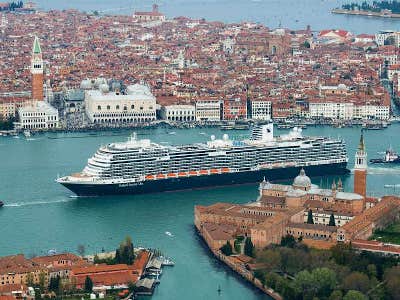
In spite of the reputation of cruises to be floating buffets, they can actually be an excellent way to visit a great number of amazing European cities in a short time. The ship typically is in port from the early morning until mid evening, often giving you the opportunity to have dinner in the city (unlike Caribbean cruises). Better still, the cruise ports are often near the center of town, so you can just walk off the ship and do sightseeing on foot or by public transportation.
Mediterranean cruises usually start at 7 nights but can go up to 3 weeks, which can provide an amazing tour of the entire region without having to pack and repack your bags more than once. They also can provide excellent value, especially compared to the price of taking trains or flights and finding new hotels in every destination.
Most popular Mediterranean departure ports
Barcelona, Spain – It’s an easy port to reach. Ships generally go from Barcelona with stops in France and then Italy.
Rome (Civitavecchia), Italy – The port isn’t very close to Rome, but it’s easy to get back and forth. Ships go west to France and Spain as well as south around the tip of Italy and then on to Croatia, Venice, and to Greece.
Venice, Italy – The cruise ships no longer dock close to the best tourist areas, but it’s easy enough to visit Venice for a day or two before boarding a ship. Ships starting in Venice go south and then head west and to Rome and then to France, or they go south to Croatia and then head east to Greece.
Athens, Greece – The cruise port of Piraeus is just south of Athens and easy to reach. Ships from Athens usually head west towards Croatia, Italy, France, and Spain, but there are also ships that visit Greek islands and Turkey.
>>>Check for deals on Mediterranean cruises
Alternative to consider: a river cruise
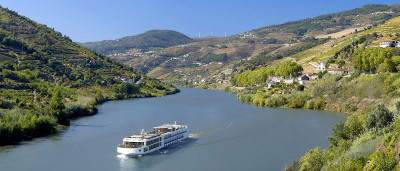
Amsterdam, Budapest, and Prague are some of the most popular river cruise ports, but there are dozens of others including many smaller towns in France where few other tourists will be when you stroll off the ship. There is little or no entertainment on the river cruise ships, but passengers don’t miss it because the entire day and into the evening is spent just steps from local cultural offerings and restaurants.
>>>Check for Europe and river cruise deals
Itinerary 5: France, Belgium, and Netherlands
Paris to Brussels: 1 hour 22 minutes
Brussels to Bruge: 58 minutes
Bruges to Amsterdam: 2 hours 45 minutes
Amsterdam to Paris: 3 hours 17 minutes
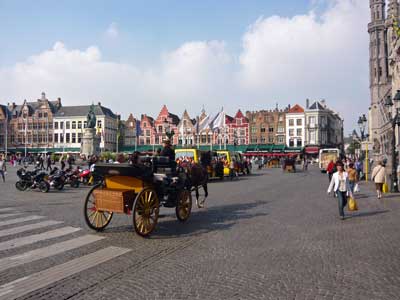
Spending 4 nights in Paris and 3 nights in Amsterdam would be a great trip, but if you want to see something else you’ve got a couple options in between. My advice is to spend an afternoon looking around the Grand Place (main square) in Brussels and then hop a 58-minute train ride to Bruges for a night or two. Brussels isn’t a great tourist city, but Bruges really is so it’s a better option for most people. Whatever you choose out of this group, you can be back in Paris on another high-speed train for your flight home.
Best add-ons to France, Belgium, and Netherlands
- Luxembourg City (1 or 2 nights)
- Cologne, Germany (1 or 2 nights)
- London (3 or 4 nights)
- Interlaken, Switzerland (2 or 3 nights)
>>>Check Paris hotel deals
>>>Check Bruges hotel deals
>>>Check Amsterdam hotel deals
Itinerary 6: Paris and elsewhere in France
- Paris (3 or 4 nights)
And a choice of:
- Nice/Cannes/Monaco (2 or 3 nights)
- Avignon (2 nights)
- Bourges (2 nights)
- Bordeaux (2 nights)
- Aix-en-Provence (2 nights)
- Reims (2 nights)
- Dijon/Burgundy (2 nights)
- Normandy (2 nights)
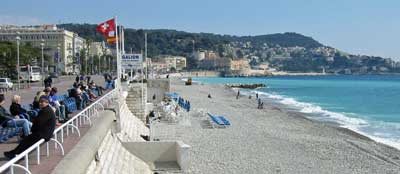
While Nice is a wonderful tourist city for a look at the French Riviera, the other larger cities of Lyon and Marseilles are probably better saved for a future trip because they are light on key sights compared to many smaller towns. Wine lovers can rent a car or take trains into Bordeaux or Burgundy. Since you can get between most of these towns by train in 2 hours or less, spending only 2 nights in each one is a reasonable option if you want to see a lot in a short time.
Normandy is an interesting choice and easy to reach in only about two hours by train from Paris. Some visitors like to see the famous WWII beaches and memorials, while others (especially in summer) like to check out one or more of the beach-resort towns. Deauville is one of the more famous of those, and it’s also famous for its horse race track and as one of the epicenters of the industry in Europe.
Best add-ons to Paris and elsewhere
- More France, of course
- London (3 or 4 nights)
- Interlaken, Switzerland (2 or 3 nights)
- Amsterdam (2 or 3 nights)
>>>Check Paris hotel deals
>>>Check Nice hotel deals
Itinerary 7: Italy
Rome to Florence: 1 hour 16 minutes
Florence to Venice: 1 hour 53 minutes
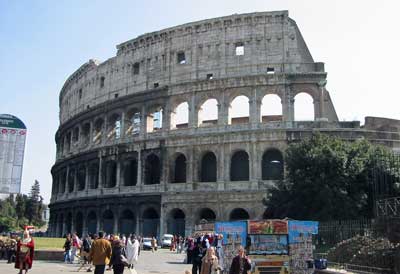
Venice is small enough that you can see the main sights in about 24 hours, and it’s so insanely crowded that many people tire of it after about a day as well. It’s better to pay more for a hotel to be on the main island and visit quickly than to save money with a hotel on the mainland where you’ll be in crowds going back and forth as well. Florence is the most relaxing of the 3, and also a great base for side trips to Pisa, Siena, and Cinque Terre, just to name a few.
Going to Italy? Here are the best first-time Italy itineraries for 3 days to 2 weeks (in much greater detail)
Best add-ons to Italy
- Milan (1 or 2 nights)
- Lake Como (2 nights)
- Siena (2 nights)
- Cinque Terre (1 night)
- Naples/Sorrento/Amalfi Coast/Pompeii/Capri (3 to 5 nights)
- Sicily (3 to 4 nights)
>>>Check Rome hotel deals
>>>Check Florence hotel deals
>>>Check Venice hotel deals
Itinerary 8: Spain
Madrid to Barcelona: 2 hours 30 minutes
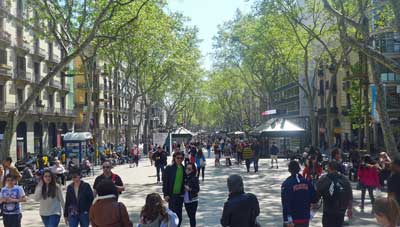
A huge part of Spain’s tourism industry is built around its southern beaches and islands such as Ibiza, Mallorca, and Tenerife (in the Canary Islands). For most people it’s best to ignore those places on your first trip because none of the beaches are special enough to spend days on them compared to the culture of the cities.
Best add-ons to Spain
By popular demand, I’ve added a full article on where to go in Spain with itineraries from 7 to 10 days up to two weeks.
>>>Check Madrid hotel deals
>>>Check Barcelona hotel deals
>>>Check Lisbon hotel deals
Itinerary 9: Germany
Berlin to Munich: 6 hours 2 minutes
Munich to Rothenburg ob der Tauber: 2 hours 56 minutes
Munich to Füssen: 2 hours 4 minutes
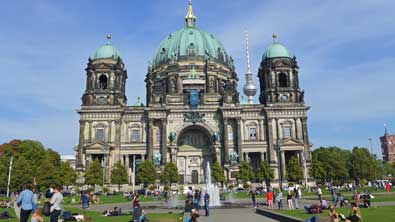
Those two cities are the keys to a Germany visit, and after that you’ve got a wide variety of choices. I cover most of the popular choices in my article on where to go in Germany, which covers several smaller towns that are major highlights.
Best add-ons to Germany
- Cologne (1 or 2 nights)
- Hamburg (2 or 3 nights)
- Amsterdam (3 nights)
- Prague (3 nights)
- Salzburg (2 or 3 nights)
- Vienna (3 nights)
- Interlaken, Switzerland (3 nights)
- Lucerne, Switzerland (2 or 3 nights)
>>>Check Berlin hotel deals
>>>Check Munich hotel deals
Itinerary 10: Switzerland
- Interlaken (3 nights)
- Bern (1 night)
- Lucerne (3 nights)
Zurich Airport to Interlaken: 2 hours 10 minutes
Interlaken to Bern: 53 minutes
Bern to Lucerne: 1 hour 50 minutes
Lucerne to Zurich Airport: 1 hour 3 minutes
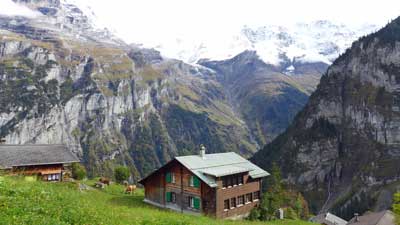
Interlaken is the best hub for the most dramatic Alps views and experiences. The one-hour cable car ride up to the Schilthorn observation deck is something you’ll never forget, and the only thing that might be more dramatic is the train ride up to the Jungfraujoch station, which is the highest in Europe. Lucerne is almost as beautiful with a scenic lake at its heart and also great mountaintop views nearby. If you do want to see a Swiss city then the capital of Bern is the most interesting and photogenic on a short visit. Read more about where to go in Switzerland for even more ideas.
Best add-ons to Switzerland
>>>Check Interlaken hotel deals
>>>Check Lucerne hotel deals
Itinerary 11: Eastern Europe’s best cheap cities
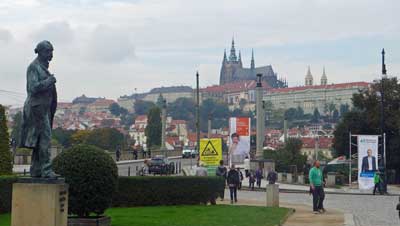
Each of these cities is beautiful and historic, but English is less widely spoken so they can also be quite a bit more challenging for a first-time visitor. Another difficulty is that the trains between them are still quite slow compared to the high-speed rail in the West, so it takes most of a day from one to another, and a bus is often a better choice. I cover this best cheap Europe itinerary more fully in the linked article.
Prague to Budapest: 6 hours 41 minutes
Budapest to Krakow: 9 hours 54 minutes (flying might be better)
Best add-ons to cheap Eastern Europe
- Cesky Krumlov, Czechia (2 nights)
- Ljubljana, Slovenia (2 or 3 nights)
- Split, Croatia (3 nights)
- Belgrade, Serbia (2 or 3 nights)
- Sarajevo, Bosnia and Herzegovina (2 or 3 nights)
- Sofia, Bulgaria (2 or 3 nights)
>>>Check Prague hotel deals
>>>Check Budapest hotel deals
>>>Check Krakow hotel deals


Hi Roger,
Thank you for taking time to answer questions! I love your website and articles. They are very informative. Could I ask a question? What are your thoughts on companies like Monograms? I am very nervous about trying to plan the transportation and accomodation and hotel transers in multiple cities. I thought this seemed like a good compromise. They handle those items and 1/2 day guided tour and the local host can help with ideas for on your own travel. I found a trip for 3 nights each in London, Paris, Venice, Florence, and Rome.
Thank you for any suggestions.
Jennifer
Jennifer,
I appreciate the kind words. I’d honestly never heard of Monograms, but now that I see their website they look very legit. Most of the information on this website is meant to help people plan their own custom trips with confidence, but I know not everyone is interested in that. Needless to say, companies like Monograms charge quite a bit for their packages and you can do basically the same things and stay in the same hotels for probably 20% or 30% less (or stay in nicer places for the same as these companies charge), but that planning also takes time. Some people (like me) enjoy travel planning almost as much as traveling, while others find it annoying or intimidating.
Looking at their London itineraries and hotels, it looks quite good and the hotels are good quality in convenient locations. If you are happy with the total price then I think this might be your best option. That said, I think if you did a trip with them to those 5 cities you’d realize how tourist-friendly and easy they actually are, and next time you’d probably book on your own. If you went to, say, Moscow on your first European trip I think companies like this are almost necessary because things there can be very confusing. I hope this helps and I’m happy to assist more if you decide to plan yourself. -Roger
Hi Roger,
I think my question got lost previously so I apologize if this is repeated and I missed the answer.
My husband and I and our three girls (19, 17, 12) did our first trip to Europe 1.5 years ago. We tacked London, Paris, Venice, Florence, Rome, Lisbon and the Algarve. We loved it so much but are not sure which countries/cities to tackle next. We are interested in Spain, Greece, Croatia and are looking at a two week trip this time where our first was three weeks. We are pretty good at being busy and moving fast if need be. We are looking at August dates and are pretty flexible. What would you recommend for our next big trip? Thanks!
Naomi,
I remember this question from about two weeks ago and you left it at the bottom of this article about Europe itinerary questions and answers. You’ll find the answer there and you can ask follow up questions on either article. -Roger
Hi Roger,
How are you doing? I am here again asking for your help! We spoke earlier when I was planning to go on my first Europe trip (solo) in May 2019, but now I have booked my flights for August, as I couldn’t take vacation in May. So my list which is still almost the same (but I planned to include Budapest) is:
Delhi -> Paris -> Amsterdam -> Berlin -> Prague -> Budapest -> Barcelona -> Paris -> Delhi
And the confusion is, which one of these is not so good in August than others, I am confused picking up city in between Amsterdam, Budapest and Barcelona, considering its my first Europe trip and I am going solo, direction wise Amsterdam is on the route but your August Cities list has Prague, Budapest and Barcelona. Even I want to get a glimpse of Barcelona but not sure if I can find trains/flights at economic rates in between these cities.
Please suggest!
Also, should I buy EU RAIL Pass or book individual train tickets as I am 28 (so pass would be expensive) and I can book 90 days before as soon as the trains are available for booking.
Thank you and looking forward to your reply.
Dear Roger,
Greetings from Rahul from Mumbai. At the outset let me thank you for the wonderful website you are running and the great repository of information which you have put in public domain for all to use. You are doing a yeoman service to all who want to visit Europe by helping them with all the information they require.
I am travelling from Mumbai to Paris from 07 Apr with my wife and daughter and will depart from Rome on 21 Apr. I have done no other booking. Seek your guidance on the itinerary mentioned below :-
1 07 Apr reach Paris at 0800 hrs – Plan to buy the Paris Pass for 02 days. Need your guidance on location/Hotel to stay in Paris,,? Plan to depart from Paris to Interlaken by 0723 am train.
2 09 Apr – Depart Paris by 0723am train from Gar de Lyon. Get down at Basel at 1023 am . Buy a Swiss pass and catch the 1059 am to Interlaken..
Have a few questions here – 1. Is this time sufficient to change trains as we will be having luggage with us? We ahve a habit of carrying lot of luggage wherever we go.
2. Where to stay in Interlaken – locality/hotel..?
3. Is it worth buying the Swiss pass?
3. 10 Apr – Planning to go to Jungfraugh. Will buying the Swiss pass help? How much time it takes to go to Jungfraugh and where to spend the evening after coming from Jungfraugh?
4. 11 Apr- Planning to go to Mt Titlis..Will buying the Swiss pass help? Can any of the above be skipped and some other interesting place we could visit?
5. 12 Apr – Planning trip to Montreux.. Is it a good place and any places of interest at Montreux?
6. 13 Apr – Planning to go to Innsbruck from Interlaken. Should one go by Air or train?
Should one go to Innsbruck or Venice instead? The train departs at 0627 am from Interlaken and has 02 stops at Bern and Zurich before reaching Innsbruck with gaps of 08 and 12 mts respectively. Is this time gap sufficient? What if any train is delayed and the connecting train goes? Request your advice regarding locality/hotel at Innsbruck
Your advice is highly solicited.
7. 14 Apr – Planning day trip to Salzburg. Is one day sufficient or should I spend the night at Salzburg?
8. 15 Apr – Planning trip to Venice from Innsbruck and stay the night at Venice. Where to stay at Venice ?
9/ 16 Apr – Planning to go to Florence from Venice and spend 02 days at Florence.
10. 18 Apr – Planning to go to Rome and spend 02 days.
11. 21 Apr – Depart by 0600 am flight to Mumbai. Your valuable inputs are highly sought.
Thanks in advance
Regards
Rahul
Rahul,
I’m glad you find this useful and I’ll try to answer your questions in order.
You can find my Paris hotel recommendations here.
You can buy a Swiss Travel Pass online and validate it when you get to Basel, which should save time. That should be enough time to change trains in Basel, especially if you already have the Swiss Travel Passes. The queue in the station travel office might be long and if you got unlucky you could miss that departing train. Those long-distance trains tend to be very close to on time, and all Swiss trains are usually exactly on time.
My advice for where to stay in the Interlaken area is on this article about where to go in Switzerland. The Swiss Travel Pass is a money and time saver for people taking enough train trips and included attractions. It only offers a 25% discount on Jungfraujoch, while it 100% covers the Schilthorn cable car. So if you do Jungfraujoch you might be better off getting a Half Fare Card, but if you do the equally amazing Schilthorn the Swiss Travel Pass will save you money. In the LUcerne area the Pass covers Mt Rigi, and only gives a discount on Titlis, so that is another one to consider.
Montreux is nice and it has a lovely location overlooking the lake, but I recommend spending most of your Switzerland time in Interlaken and Lucerne because the scenery is stunning and the Swiss cities aren’t as special.
Innsbruck is primarily a ski resort town and there is very little to see or do aside from that. Salzburg is MUCH more interesting and I’d go there instead.
Venice is also amazing and you can find my Venice hotel advice here. Two nights in Florence should be enough, but three nights in Rome is better if you can manage it. Otherwise your trip looks really great. -Roger
Hi Roger,
I love your website, very informative, and the fact that you are very generous with responding to questions is quite nice as well.
I am planning a trip to Europe in September 2019, and for now we are looking at visiting the UK, Italy and Spain. We are thinking of going away for 3 weeks in total. I personally have traveled to the popular Spanish cities (Barcelona, Madrid, Seville, Granada), but my partner has not. What would your recommended itinerary for us? We both like mixing exploration with relaxation.
Any input is greatly appreciated – it is quite overwhelming the initial phase of planning…
Regards,
Rach
Rachel,
Thank you and I’m happy to try to help. This sounds like a great trip, but planning it is a bit tricky with those three countries because you’d obviously need to fly between each of them. If you added Paris and perhaps somewhere else in France you could potentially then add Italy OR Spain and take trains the whole way. Since you’ve already explored Spain (and personally I think Paris and France are better for first-time visitors) I would give that some thought. You could do London (Eurostar train to) Paris to Nice to Venice to Florence to Rome, and still probably have time for one more stop or a few side trips.
Staying just with those three countries you’d want to do London for 3 or 4 days and then if you wanted to add more stops they’d probably be Edinburgh or York or Bath. Then you’d fly to Venice and spend 1 or 2 nights there and then a train to Florence for 3 nights and then a train to Rome for three nights, and then fly to Barcelona. After 3 nights there you could take a train to Madrid or Valencia and then go wherever you prefer based on your own previous experience. Then you’d fly back to London for your flight home.
For me a big part of the magic of European trips is getting around by train so I heavily favor doing that when you can. Another option that would be even more amazing is to London to Paris to Switzerland to Italy. It would be nice to add some lovely scenery in between all those cities on a trip that long, and the train connections that way are nicer than going through Nice to Venice, and they include an amazing train ride through the Alps from Interlaken to Milan and then to Venice. I’m happy to help more as you continue to plan and I hope this helps. -Roger
Hi Roger,
I just found your site last week. I’m very overwhelmed trying to pick a place for our trip and would love any advice you have for me. My husband and I are planning a 25th anniversary trip. We live in the Midwest US and are considering Europe. We have about $8k-$10 to spend on the entire trip-flights, trains, hotels, excursions, food, souvenirs, etc.
We think we can do about 10-14 days. I have been to Europe but when I was in high school and it was a 10 day whirlwind trip through several countries so I am definitely open to going to London, Paris, etc again-my husband has not been to Europe).
Possible ideas are London, Paris, Amsterdam (I figured staying relatively close we would lose less of our trip traveling between places) Will we be overwhelmed doing only big cities? Or will we start to figure them out after a few days? We live in a rural area and not near a large city so we are not used to trains and public transportation.
Italy-Rome, Florence, Venice, Amalfi coast or Cinque Terre (I’ve not been to Italy)
Greece
Ireland
What are your thoughts? We like to do a variety of activities and enjoy both big and small cities and beautiful things in nature.
Thank you for any help. I apologize for typing my question twice. I am very nervous about planning this trip and truly would appreciate your opinion.
Jennifer
Hi Roger,
You have been very patient with all the replies, thank you for taking out time for us. I am planning to travel somewhere around November 1st week for approximately 8-9 days in total. We will be traveling from Mumbai. I know it is not exactly the right time to visit but that is when we are getting those holidays.
We are 5 in total , 2 Sr Citizens (70 and 60) , me and wife in our 30s and my daughter who would be almost 2 years by then. Me and my father have visited Paris , Barcelona, London but that was purely for work,
We do not want to plan London and anything which will involve too much of walking. Would prefer to travel the whole way by renting a car, so as to save on train and flights cost too.
Looking forward to your reply.
Parimal
Parimal,
Renting a car in Europe can be a good idea for groups of 4 or 5 people like yours, but it also limits the types of places that you can visit conveniently. The main problem is parking. European cities purposely discourage private car trips in the city centers so they charge a LOT for parking the closer you are to the center. So, for example, if you drove to Rome you could park for free on the outskirts of the city, but then you’d have to spend time and money taking buses or trains into the city center for sightseeing. Or you could drive into the middle of the city but you might have to pay €50 a day to park, and you wouldn’t want to use the car for sightseeing anyway because you’d have to pay a lot to park at each stop.
On the other hand, you COULD rent a car and focus mostly on smaller towns and pay little or nothing to park. You generally don’t get world-class sights in smaller towns (Eiffel Tower, Coliseum etc), but it can still be very enjoyable. Also, there are road tolls to pay in much of southern Europe, although they don’t really add up to much compared to the cost of the whole trip for 5 people.
In November it seems best for a road trip to focus on southwestern Europe. Driving in Italy can be challenging for newcomers, although no more challenging than Mumbai. I’d probably focus on some combination of Italy, France, Spain, and possibly Portugal. My normal recommendation is to stay 3 nights in almost any city you visit, but a road trip to smaller cities is different so you could go much quicker if you wanted to. Hopefully this at least gives you an idea of how you might do the trip.
It’s also worth mentioning that train tickets bought well in advance can be quite cheap in much of Europe, and specifically in Italy. A child under 2 would travel for free and the seniors would probably get discounted tickets, so that could end up being cheaper depending on where you went. For example, If you flew into Rome and then took a train to Florence for 3 or 4 days and then a train to Venice for a day or two and then a train back to Rome for your final 3 or 4 days, those train tickets might only be €400 for all the rides for all four paying passengers or possibly less. That way you could stay in the city centers and take public transportation so there isn’t so much walking. And a car hire plus fuel plus parking plus toll roads is almost certainly going to add up to quite a bit more than that. Italy is quite nice in November as well, so it’s something to think about. Let me know if you have any other questions. -Roger
My husband and I are planning a 25th anniversary trip. We live in the Midwest US and are considering Europe. We have about $8k-$10 to spend on the entire trip-flights, trains, hotels, excursions, food, souvenirs, etc.
We think we can do about 10-14 days. I have been to Europe but when I was in high school and it was a 10 day whirlwind trip through several countries so I am definitely open to going to London, Paris, etc again-my husband has not been to Europe).
Possible ideas are London, Paris, Amsterdam (I figured staying relatively close we would lose less of our trip traveling between places)
Italy-Rome, Florence, Venice, Amalfi coast (I’ve not been to Italy)
Greece
Ireland
What are your thoughts? We like to do a variety of activities and enjoy both big and small cities and beautiful things in nature.
Thank you for any help.
Jennifer
Hi Roger,
My boyfriend and I plan to take a Euro trip from the states in the summer of 2020 (I am a teacher so i prefer to travel without taking any personal days)! We would like to go for 14 days and visit London, Paris, Amsterdam, and potentially Barcelona, Spain or another destination. We are open to the 4th destination. What are your thoughts on the order of the trip, as well staying in hostels? We are in our early 20s and very mindful of money, yet still want a full experience for our first Euro trip. We are also very much on board with traveling by train, as you made it sound simple, relaxing, and efficient! Thanks for all you do for us travelers!
Best,
Sarah
Sarah,
I think your plan sounds great just as it is. London, Paris, and Amsterdam are all on my list of Top 5 European cities to visit before the others, and Barcelona is easily in my Top 10. Also, unlike the others, Barcelona is a beach town (sort of) and in summer it has a really fun vibe that is different from those others.
The order looks great as well. Fly into London after 3 or 4 days take the Eurostar to Paris and after 3 or 4 days take the high-speed train to Amsterdam and then after 3 days there fly down to Barcelona for 3 days and then probably a flight back to London for your flight home.
Staying in hostels will be fun at your age and each of those cities is loaded with good ones. In some cases you might find private rooms for two in hostels for not much more than two dorm beds, and it could be good to mix them up a bit. Hostels are great value and also the best way to get plugged into activities and other travelers in your age group. I’m happy to answer any other questions if you have them. -Roger
Hi Roger
I just came across this today, love the info and knowledge you provide.
My husband and I are planning a 2 week trip, arriving in London Aug 22nd and departing Sep 5th. We will be in London for 3 of those days visiting friends. We have been thru a lot of Italy already, have travelled to Paris, Bordeaux and Scotland. We are having a hard time deciding where to spend the remainder of our time, talked about Ireland, Germany, Croatia, Prague, Portugal and cannot make up our mind. I like to stay at least btwn 3 to 5 nights in each city, would love to hear your insight.
Renu,
I’m glad you found this site and I’ll be happy to try to help. Those ideas of yours could each be great, but the tricky part (as you certainly know) is that they are all quite far from each other so combining them would require flying and a fair amount of hassle. Since you’ve got about 11 days to work with and you mentioned you don’t like to rush around, it seems wise to choose 3 cities in addition to London, and ideally they will be reasonable train rides from each other.
I’d probably save Ireland for its own trip, although it’s obviously a pretty easy place to get to from London. You could spend 3 or 4 days in London and then fly to Dublin for 2 or 3 days and then rent a car to drive around to the various castles and smaller towns that Ireland is known for. I’d probably save Croatia as well because the beach areas and all other popular areas will be packed with Germans and other northern Europeans through the end of August. In May or September it would be great. Portugal will be similar in that the beaches will be packed through August, although Lisbon and Porto won’t be too bad.
My top recommendation would be Prague and Berlin, and then choose one of these: Munich, Salzburg, Vienna, or Cesky Krumlov. Those four cities are each fantastic in their own right and each is a convenient train ride from Prague. You could fly from London to Berlin and then take a train to Prague and then a train to the last city and then a flight back to London for your flight home. Cesky Krumlov doesn’t have a major airport nearby, but it’s only 3 hours by train from Prague (or by bus or shuttle to Vienna or Salzburg). Let me know if you have any other questions. -Roger